A_rose_for_Emily赏析
ARoseForEmily鉴赏知识分享

Emi l y A Ros e For鉴赏A Rose For EmilyThe short story “A Rose For Emily ” draws a vivid picture of thesouther n tow n Jeffers on of the Un ited States. Though the plot is not complicated, yet it can be regarded as a panorama of Faulkner ' s works. It attr acts readers ' attention successfully and makes us immersed in the whole story. And the ingenious usage of symbolism is a distinctive feature, which makes the story filled with profound implicatio ns. There are several differe nt symbolic subjects in it, such as the house, Miss Emily, Barron Homer and so on. In this thesis, the author tries to discuss them one by one from his point of view.《献给爱米丽的一朵玫瑰花》写得精致、完美;有如大理石上的雕刻图案,含有值得永久纪念的神圣意味。
世界驰名的威廉•福克纳(William Faulk ner) —向以长篇小说震撼世人。
他的《喧哗与骚动》、《押沙龙,押沙龙!》已成为20世纪无可争议的杰作。
意识流的手法娴熟运用,确立了他作品意象迭变、繁复多元的风格。
a rose for Emily 分析
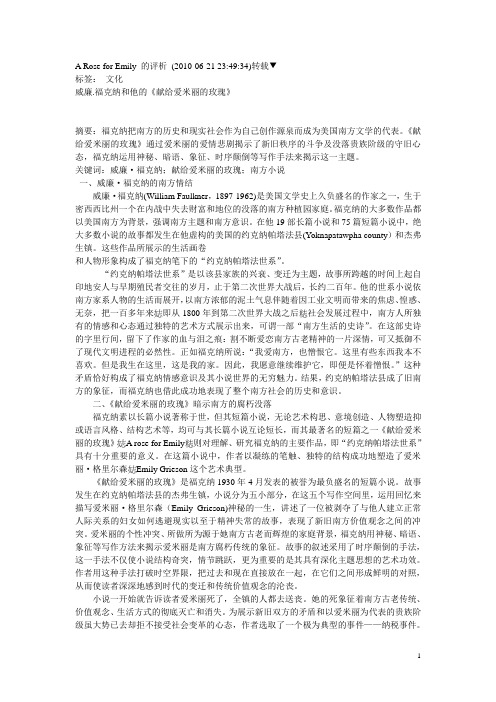
A Rose for Emily 的评析(2010-06-21 23:49:34)转载▼标签:文化威廉.福克纳和他的《献给爱米丽的玫瑰》摘要:福克纳把南方的历史和现实社会作为自己创作源泉而成为美国南方文学的代表。
《献给爱米丽的玫瑰》通过爱米丽的爱情悲剧揭示了新旧秩序的斗争及没落贵族阶级的守旧心态,福克纳运用神秘、暗语、象征、时序颠倒等写作手法来揭示这一主题。
关键词:威廉·福克纳;献给爱米丽的玫瑰;南方小说一、威廉·福克纳的南方情结威廉·福克纳(William Faulkner,1897-1962)是美国文学史上久负盛名的作家之一,生于密西西比州一个在内战中失去财富和地位的没落的南方种植园家庭。
福克纳的大多数作品都以美国南方为背景,强调南方主题和南方意识。
在他19部长篇小说和75篇短篇小说中,绝大多数小说的故事都发生在他虚构的美国的约克纳帕塔法县(Yoknapatawpha county)和杰弗生镇。
这些作品所展示的生活画卷和人物形象构成了福克纳笔下的“约克纳帕塔法世系”。
“约克纳帕塔法世系”是以该县家族的兴衰、变迁为主题,故事所跨越的时间上起自印地安人与早期殖民者交往的岁月,止于第二次世界大战后,长约二百年。
他的世系小说依南方家系人物的生活而展开,以南方浓郁的泥土气息伴随着因工业文明而带来的焦虑、惶惑、无奈,把一百多年来即从1800年到第二次世界大战之后社会发展过程中,南方人所独有的情感和心态通过独特的艺术方式展示出来,可谓一部“南方生活的史诗”。
在这部史诗的字里行间,留下了作家的血与泪之痕:割不断爱恋南方古老精神的一片深情,可又抵御不了现代文明进程的必然性。
正如福克纳所说:“我爱南方,也憎恨它。
这里有些东西我本不喜欢。
但是我生在这里,这是我的家。
因此,我愿意继续维护它,即便是怀着憎恨。
”这种矛盾恰好构成了福克纳情感意识及其小说世界的无穷魅力。
结果,约克纳帕塔法县成了旧南方的象征,而福克纳也借此成功地表现了整个南方社会的历史和意识。
a rose for emily 句子语法解析

a rose for emily 句子语法解析1. “A rose for Emily”里的这个句子“She stared at the rose with a mix of longing and sadness.”,难道你们不觉得“with a mix of longing and sadness”这个短语用得超妙吗?就好像一个人心里又盼着又失落,那种纠结的心情一下就出来啦!比如说“他看着远方的家,with a mix of hope and fear.” 这不就把又期待又害怕的感觉展现得淋漓尽致?2. 来瞧瞧“A rose for Emily”中的这句“He walked away slowly, as if carrying the weight of the world.” 这“as if carrying the weight of the world”难道不是形象极了?这不就像咱们有时候感觉压力山大,“她垂着头,as if carrying all the troubles of the universe.” 是不是特别有画面感?3. “The room was filled with the scent of a rose for Emily, like a sweet dream.” 这个句子里的“like a sweet dream”,你们难道不觉得特别浪漫?就好比“她的笑容was like a bright star.” 是不是一下就让人感受到那种美好?4. 看看“A rose for Emily”中的“Her heart was as cold as ice when she saw the rose.” 这“as cold as ice”用得多生动啊!比如说“他的态度 was as hard as stone.” 是不是很容易就明白那种冷冰冰的感觉?5. “The rose lay on the table, silent but powerful.” 这里的“silent but powerful”是不是很有意思?就像“那座山stood there, silent but majestic.” 是不是让人忍不住去想象那种沉默又强大的力量?6. “A rose for Emily”里有这么一句“He spoke in a voi ce as soft as a whisper.” 这“as soft as a whisper”难道不让你觉得轻柔无比?好比“她的脚步was as light as a feather.” 是不是特别有感觉?7. “The rose seemed to tell a story, a story full of mysteries.” 这个句子里“seem to tell a story”是不是很吸引人?比如说“那幅画 seemed to reveala secret.” 是不是让你特别好奇?8. “Her eyes shone like stars when she received the rose for Emily.” 这“shone like stars”多形象呀!像“他的智慧shone like a lamp.” 是不是一下子就突出了那种闪耀?9. “The rose was a symbol of hope in the darkness of her life.” 这里的“a symbol of hope”是不是很有深意?就像“那盏灯 was a symbol of guidance in the fog.” 是不是让人能体会到那种重要性?10. “A rose for Emily, a love that never died.” 这“a love that never died”难道不令人感动?比如“一份友谊that never faded.” 是不是很能勾起情感?11. “The rose trembled in the wind, as if afraid of something.” 这“as if afraid of something”是不是特别有趣?像“那片叶子 trembled in the rain, as if in pain.” 是不是能感觉到那种不安?12. “His words about the rose for Emily were like a gentle breeze, touching her heart.” 这里的“like a gentle breeze”多温柔啊!好比“她的安慰were like a warm hug.” 是不是特别暖心?13. “The rose stood out among the weeds, just like a diamond in the rough.” 这“just like a diamond in the rough”难道不精彩?比如说“他的才华stood out in the crowd, just like a pearl in the sand.” 是不是很能突出与众不同?14. “A rose for Emily, a promise that was never broken.” 这“a promise that was never broken”是不是让人感到坚定?就像“一个梦想 that was never given up.” 是不是很有力量?15. “The rose bloomed beautifully, as if showing off its charm.” 这“as if showing off its charm”是不是很俏皮?比如“那只鸟 sang loudly, as if showing off its voice.” 是不是很生动?16. “Her smile when seeing the rose for Emily was like the first ray of sunshine in spring.” 这“like the first ray of sunshine in spring”多温暖!好比“他的出现was like the first drop of rain after a drought.” 是不是让人充满希望?17. “The rose withered gradually, but its memory lingered on.” 这里的“but its memory lingered on”是不是很有韵味?像“那段时光 passed quickly, but its influence lasted forever.” 是不是能感受到那种持久的影响?18. “A rose for Emily, a key to unlock her heart.” 这“a key to unlock her heart”是不是很神秘?比如说“一本书was a key to open his mind.” 是不是让人想要探索?19. “The rose glowed in the moonlight, as if it had its own soul.” 这“as if it had its own soul”是不是很神奇?像“那座城堡 glowed in the night, as if it had its own story.” 是不是充满了幻想?20. “A rose for Emily, a dream that came true at last.” 这“a dream that came true at last”难道不让人欣喜?比如“一个愿望 that was fulfilled eventually.” 是不是特别让人开心?。
A rose for Emily中译本赏析,以杨岂深的译本为例

“A Rose for Emily”中译本赏析——以杨岂深的译本为例摘要:A Rose for Emily 《献给埃米莉的玫瑰》讲述了美国南北战争后南方小镇-----杰弗逊镇上没落的格尔森贵族家庭中埃米莉的悲剧故事。
作者威廉·卡斯伯特·福克纳(William Cuthbert Faulkner)为美国文学史上最具影响力的作家之一,美国“南方文艺复兴”时期成就最显著的南方作家和现代主义作家。
以杨岂深先生的译本为例,对小说分别从忠实的标准,形似与神似的矛盾,主人公对话语言的描写三个方面进行翻译研究,有益于提高读者的文学素养,提升文学翻译实践能力。
关键词:埃米莉;译本;忠实;形似与神似;对话Abstract: A Rose for Emily tells the tragic story of Emily Grierson, the daughter of a noble declining family, which happened in a small southern American town-----Jefferson after American Civil War. The author, William Cuthbert Faulkner, is one of the most influential writers in the American literary history, the most significant Southern writer and modernism writer in the American "Northern Renaissance" period. This paper is based on the version of translator Yang Qishen. Mainly discusses the translation study from three aspects—— faithful standard, the contradictions between appearance and soul , description of the heroine's conversation, which will be helpful for the improvement of readers 'literary accomplishment, and contributes to the well study of literary translation.Key words:Emily; version; faithfulness; contradictions between appearance and soul; conversation前言A Rose for Emily《献给埃米莉的玫瑰》为南方文学鼻祖威廉•福克纳(William Faukner)所创作的著名短篇小说,1930年4月发表时被誉为最负盛名的小说。
A Rose For Emily(献给艾米丽的玫瑰花)
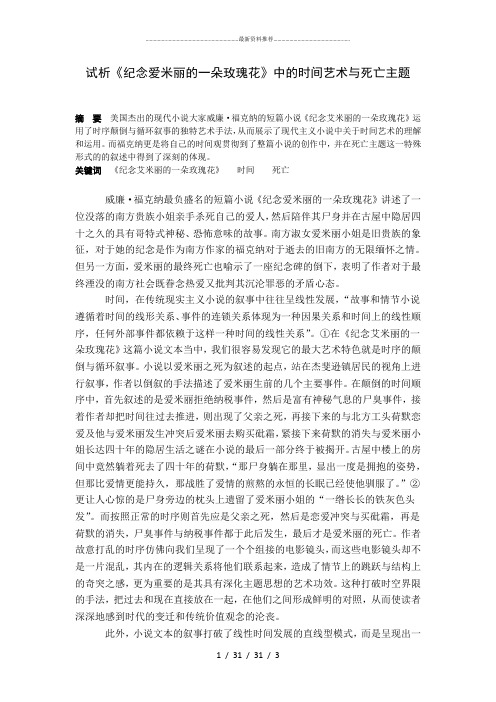
试析《纪念爱米丽的一朵玫瑰花》中的时间艺术与死亡主题摘要美国杰出的现代小说大家威廉·福克纳的短篇小说《纪念艾米丽的一朵玫瑰花》运用了时序颠倒与循环叙事的独特艺术手法,从而展示了现代主义小说中关于时间艺术的理解和运用。
而福克纳更是将自己的时间观贯彻到了整篇小说的创作中,并在死亡主题这一特殊形式的的叙述中得到了深刻的体现。
关键词《纪念艾米丽的一朵玫瑰花》时间死亡威廉·福克纳最负盛名的短篇小说《纪念爱米丽的一朵玫瑰花》讲述了一位没落的南方贵族小姐亲手杀死自己的爱人,然后陪伴其尸身并在古屋中隐居四十之久的具有哥特式神秘、恐怖意味的故事。
南方淑女爱米丽小姐是旧贵族的象征,对于她的纪念是作为南方作家的福克纳对于逝去的旧南方的无限缅怀之情。
但另一方面,爱米丽的最终死亡也喻示了一座纪念碑的倒下,表明了作者对于最终湮没的南方社会既眷念热爱又批判其沉沦罪恶的矛盾心态。
时间,在传统现实主义小说的叙事中往往呈线性发展,“故事和情节小说遵循着时间的线形关系、事件的连锁关系体现为一种因果关系和时间上的线性顺序,任何外部事件都依赖于这样一种时间的线性关系”。
①在《纪念艾米丽的一朵玫瑰花》这篇小说文本当中,我们很容易发现它的最大艺术特色就是时序的颠倒与循环叙事。
小说以爱米丽之死为叙述的起点,站在杰斐逊镇居民的视角上进行叙事,作者以倒叙的手法描述了爱米丽生前的几个主要事件。
在颠倒的时间顺序中,首先叙述的是爱米丽拒绝纳税事件,然后是富有神秘气息的尸臭事件,接着作者却把时间往过去推进,则出现了父亲之死,再接下来的与北方工头荷默恋爱及他与爱米丽发生冲突后爱米丽去购买砒霜,紧接下来荷默的消失与爱米丽小姐长达四十年的隐居生活之谜在小说的最后一部分终于被揭开。
古屋中楼上的房间中竟然躺着死去了四十年的荷默,“那尸身躺在那里,显出一度是拥抱的姿势,但那比爱情更能持久,那战胜了爱情的煎熬的永恒的长眠已经使他驯服了。
”②更让人心惊的是尸身旁边的枕头上遗留了爱米丽小姐的“一绺长长的铁灰色头发”。
a rose for emily解读与译赏

a rose for emily解读与译赏《A Rose for Emily》是美国作家威廉·福克纳的短篇小说,被认为是福克纳最杰出的作品之一。
这个故事揭示了一位孤独的南方女性艾米丽·格里森的生活,以及她与社会的冲突和疏离感。
故事以艾米丽的葬礼开始,随后回溯到她生前的往事。
艾米丽是一个古怪而孤立的人物,她居住在一个受到时间遗忘的南方小镇,被当地人视为传奇。
她的父亲在她年轻的时候过世,使得她变得孤独和隐居。
她与一个北方建筑师霍默·巴伦的关系引起了镇上人的不满和猜疑,但他们之间的真实情况始终是个谜。
艾米丽的生活充满了秘密和谜团,她甚至杀害了她的恋人霍默并将他的尸体保存在一个密封的房间中。
这种行为揭示了她的精神崩溃和对时间的无法接受。
她试图保存过去的美好时光,但却无法逃脱时间的流逝。
作者通过描写艾米丽的故事,深入探讨了社会和传统观念对个体的压迫和破坏。
这个故事中的玫瑰象征着美好的过去和爱情。
艾米丽失去了父亲和她的恋人,她试图保留他们的存在并抵抗时间的消逝。
她在封闭的世界里过着与现实隔绝的生活,就像一个被遗忘的花朵。
然而,随着时间的推移,玫瑰凋谢了,就像艾米丽最终被时间所击败。
《A Rose for Emily》是福克纳对南方社会的批判,揭示了社会对个人的限制和破坏力量。
艾米丽代表着被压迫和被孤立的个体,她的悲剧反映了整个社会体系的腐败和堕落。
通过描写艾米丽的故事,福克纳呈现了一个关于时间、孤独和爱的复杂而深刻的图景。
总之,《A Rose for Emily》是一部充满象征主义和深度的文学作品,通过描述一个女性的孤独和精神崩溃,揭示了社会对个体的压迫和摧毁。
福克纳通过这个故事,向读者展示了一个关于时间、爱和社会的不公的悲剧。
A_rose_for_Emily赏析.doc

A_rose_for_Emily赏析.doc《献给艾米丽的玫瑰》是美国著名作家威廉·福克纳的代表性短篇小说之一,讲述了一个有关孤独和死亡的故事。
小说叙事手法巧妙,通过回溯式叙事、时间叙事和意识流等手法,将人物的内心感受和思想渐次展现,在淡雅的笔触下,揭示出人性的各种暗面,让人深思和共鸣。
小说主要讲述了南方小镇杰斐逊市的一位老处女艾米丽·格里森的一生。
在小说的开头,艾米丽被描述为一个古怪的老太太,她家里充满了过时的东西,而她自己也常常被乡亲们阻挠。
接着,小说通过回溯式叙事,讲述了艾米丽的一生,其中最重要的部分是她与一个年轻的北方建筑师荷马的关系。
荷马是一位充满生机和活力的年轻人,他的到来为杰斐逊市带来了新的生命和希望。
然而,荷马的出现并没有给艾米丽带来幸福,反而让她更加孤独和悲伤。
艾米丽沉迷于对荷马的爱情中,不断地对他进行控制和束缚,最终导致了荷马的死亡。
为了保持她的爱情不死,艾米丽甚至在荷马死后将他的尸体保存了下来,直到她自己去世。
小说最后一段描述了艾米丽死亡之后,人们在她家里发现了荷马的尸体,这是一个极其恐怖和荒谬的场景。
艾米丽为了守护自己的爱情,不惜走向疯狂和破坏。
整个小说通过叙事技巧和情节安排,将艾米丽的生活和性格深入地展现出来,既描述了她生活的历程和经历的痛苦,也揭示了她内心的苦闷和恐惧。
《献给艾米丽的玫瑰》在结构上非常紧凑,通过叙事的逐层深入,将人物的形象和内心深处逐渐丰富起来。
福克纳的笔法又非常细腻,运用隐喻、象征、反讽等众多手法来刻画人物和表达主题。
这些手法让读者在阅读过程中不仅能够深刻理解人物的内心,还能够共鸣和思考他们所代表的意义。
总之,《献给艾米丽的玫瑰》是一篇富有深度和思想性的小说,它通过对艾米丽一生的描写,呈现了生命和死亡、孤独和爱情等多重主题,令人深感震撼和感悟。
它不仅是福克纳作品中的经典之作,也是世界文学史上不可忽略的一篇文学佳作。
A-rose-for-Emily赏析

A-rose-for-Emily赏析Ⅰ.Introduction“A Rose for Emily”is a classic story representing Faulkner’s favorite subject, theme and style. The story is set in the town of Jefferson in his imaginary Yoknapatawpha County, the “mythical kingdom”. The story begins w ith a funeral of the eponymous Miss Emily. It does not follow a particular order of chronological time. The narration flows backwards or forwards in a line of reality, revealing significant details of Emily’s life and the murder of the Homer Barron by Emily, which are suspended till the end of the story. The narrative is also divided into five parts, allowing for flexible shifts in time and displays of Emily’s image at various stages of her life. Through the story about Emily, the author tries to pinpoint an unavoidable fate of the aristocracy and various changes in the South America after the Civil War.In this story, Emily Grierson, the main character, is a victim. Dominated by her father and his rigid ideas of social status, she has been prevented from ma rrying during her lifetime. One year after her father’s death, she falls in love with a northerner. When she finds that her lover is not going to get married with her, she poisons him so that she can keep him with her forever. Though the plot of the story is not complicated, yet it can be considered as a minor program of his works. In it are examples of Faulkner’s artistic preoccupations and techniques: the exploration of psychological reality, the social structure and mores of a southern community, the nature of time, and the relation of the past to the present. This paper will approach the story from the following aspects: analysis of Emily’s character, the root causes of her characters and her destiny.Ⅱ.Analysis of Emily’s charactersEmily is the main character, the protagonist of the story. In this story, the author mainly focuses and reveals the main characte r—Emily. In order to analyze Emily’s character, some question s have at first to be answered: What type is this story or what kind of theme this story plans to reveal? Whenanswering these questions, it becomes much easier to analyze her character. Miss Emily is kind of quiet and perverse, proud and aloof, haughty, brave and tough, a representative of traditional convention and so forth. The followings are going to expatiate on them.2.1 Miss Emily’s haughty characterAt the very first, Emily is easy to be regarded as a haughty woman. In the story, the writer not only reveals the abnormal phenomenon of Emily’s grotesque character and her ill-sexed psychology, but also lively portrays her as a strong figure of haughtiness. Miss Emily Grierson is the socialite of her town. Naturally with this status there is a certain reputation she has to withhold. She not only represented her family name but, in a sense the people of her town. Because she was such a dominant figure the townspeople had put her on a pedestal and were very attentive to her actions. During the time in which her father was alive Emily was seen as a figure to be admired but never touched. Many wooers she had but according to her father’s standard, none were suitable enough.2.2 Miss Emily’s isolated and eccentric characterBesides, Miss Emily is isolated and eccentric. From the whole story, there is no doubt that she was an isolated one from the beginning of the story to the surprising end. All her life is the town people’s topic after meals.They regard her as a monster. And because of her family, in particular, her father, she nearly get separated from her neighbors, which adds more pressure to her personal affairs to fall in love with the Yankee, HomerBarron, which, at last, creates the tragedy. On the other hand, she is eccentric at the same time. When the men from the government want to tax her after her father’s death, but they are refused by Emily. The reason is quite simple, that is, when her father is alive, in Jefferson, they need not to pay taxes. She just tells the government that she has no taxes in Jefferson. What she said was the matter several years ago. And there was once a man called Colonel Sartoris explained it to her about her tax-free privilege. She does not respect the truth, that is, her so-called Colonel died ten years ago and new policy comes into practice. The narrator arranges the specific detail on her behavior of buying Arsenic. The druggist can not imagine her purpose in buying the poison and just thinks that she might use it for rat and such things. Miss Emily just stares at him, her head tilts back in order to look him eye for eye, until he looks away and goes and gets the arsenic and wraps it up for her. How strange and eccentric she is. She does not allow anyone to ask about her matter, even though it is a dangerous affair which is forbidden by law.2.3 Miss Emily’s necrophiliaMiss Emily is a necrophilia, too. Greatly surprised at the sight of the last paragraph of Faulkner’s short-story “A Rose for Emily”, the town people findthat Miss Emily is not only a murderer, but also sleeps with Homer Barron after she kills him. Then it is noticed that in the second pillow is the indentation of a head. One of the townspeople lifts something from it, and leans forward, finding the faint and invisible dust dry and acrid in the nostrils, and a long strand of iron-gray hair. Horribly, she kills her lover and sleeps next to him for a long time until being found out. As for the whole passage, the narrator refuses to dismiss Emily as simply mad or to treat her life as merely a grotesque, sensational horror story.Instead, his narrative method broughtus into her life before we hastilyrejected her, and doing so offered us acomplex imaginative treatment of fiercedetermination and strength coupledwith illusions and shockingeccentricities.42.4 Miss Emily’s braveness and toughnessShe is brave and tough as well. As a woman, Emily is normal. She just tries her best to pursue her happiness. In this story, the most attractive part for a great number of people is Emily’s brave pursuit of love. Only after her father’s death, she begins to have the right to love. “In the summer after her father’s death, she has her hair cut short and looks like a little girl. Soon she falls in love with Homer, who is a Yankee, a northerner and a day labor as well.” She holds her head high in her dignity as she is the last Grierson of her family though the townspeople think she has fallen because she is with a man who is different from her. However, Emily’s love affair is not affected by the townspeople and her two female cousins’ interference. What’s more,Ⅲ.Intrinsic and extrinsic Reasons3.1 Intrinsic reasons3.1.1 FamilyIt is her family, especially her father that influences her so much. Emily, the heroine in the story, is a victim. Dominated by her father and his rigid ideas of social status, she has been prevented from marrying during his life time and therefore after his death, she is left alone and penniless. Her dependence on her father continues even after he dies; she refuses to bury him and keep his portrait in a prominent place in her living room. Emily not only clings to her father’s memory, she also begins to assume his domineering traits. She does not accept the passage of time and changes or the inevitable loss that accompanies it. It is not just pathetic attempts to cling to the past, it develops into obsession and finally, homicidal mania. Rather than lose Homer as she lost her father, she kills him in order to keep him. She lives many years as a recluse. Abnormal characters are easy to form when under such strong pressure. It is Emily’s family that ruins her life and then Homer’s.3.1.2 PhysiologyEmily’s typical characters are cause by another important reason, namely, the physiological one. From Freud Sigmund’s narration, there are three conceptions which are connected to the analysis needed to understand, that is, Id, Ego, and Super-ego.They are the three parts of the fictive “psychic apparatus” defined in Freud’s so-called structural model of the psyche; they are thethree theoretical constructs in terms of whose activity and interaction mental life is described. According to this model, the uncoordinated instinctual trends are the “id”; the organized realistic part of the psyche is the “ego”, and the critical and moralizing function the “super-ego”. The Id comprises the unorganized part of the personality structure that contains the basic drives. The Id is unconscious by definition.6 Id is human’s first reaction when human physiological needs happen, which is also an unorganized phenomenon. Miss Emily just tries her best to chase her happiness as other normal women do. From this angle, Miss Emily has the right to fall in love with Homer and to have their own family. What she has done is within the common practice. However, a lot of elements result in the tragic sequel. It is she that can not grasp the physiological element and causes her unhappy or even miserable destiny.3.1.3 Pathology and psychologyThere is another important intrinsic reason, that is pathological and psychological one. From her behavior to her father Mr. Drieson, she is complete Elctra Comlex(恋父情结). She lived with her father when Mr. Grieson was alive, without communicating with others. Mr. Grieson controlled her whole life completely, which is the root that causes Miss Emily’s tragedy and Homer’s. What is more, Emily’s father drove away all the young men who were going to chase his daughter for the reason that he just wanted to hold Emily for himself. In Emily’s sub-consciousness, her father is her lover. It is this kind of abnormalpsychology that influences the formation of Emily’s abnormal characters. In Emily’s eyesight, losing her father amounts to losing her lover. And that means she will be alone from that time on. Therefore, she refuses to bury her father even though he has been dead for several days. And at last she kills her own lover just in order to keep him with her.3.2 Extrinsic reasonsWhen referred to intrinsic reasons, it is easy to think of extrinsic reasons causing Miss Emily’s characters and her destiny. What is more, the extrinsic reasons play a crucial role on her which worth of researching here.3.2.1 Cultural traditionCultural tradition makes great impact on Emily’s characters and the tragedy. Faulkner was aware of the Southerners’ association with the South tradition,not only physical,but spiritual as well; so he took pains to picture a group of Southerners who desperately submitted to the old way of life.But as an artist of the twentieth century, he observed the gradual changes of the South: the old veterans were dying of, and the old loyalties were adjusted to conform to new conditions.In “A Rose for Emily”,Faulkner described the conflicts between the old tradition and the new order, and the doomed defeat of the old tradition.Emily lived in her big and squarish frame house, which Grierson family thought the great choice. But her house was on its way to “coquettish decay above the cotton wagons and the gasoline pumps. And the once most select street which was filled with houses decorated with cupolas and spires and scrolled balconies in the heavily l ightsome style of the seveties”was then encroached and obliterated by garages and cotton gins. Faulkner admired somewhat the merits of the South tradition—the compassion and humanity men like Colonel Sartoris and his peer s–inherited forced them to tell a kind lie toEmily so as to look after the single lady without insulting her dignity.But only a man of Colonel Sartoris’generation and thought could have invented it. The moral values of the South tradition were lost.The new generation of public officials may be more efficient and businessman-like. They were more practical; the next generation,with its more modern ideas,produced some little dissatisfaction with the hereditary obligation upon the town. but the old generation like Judge Stevens totally objected to the idea for it was shameful to let others know that such noble lady had smell on her faces. The conflicts between the old generation and the new one indicated the decline of the Southern tradition.Faulkner believed that it was the moral values—courage,honor,pride,compassion,liberty and justice that produced the glorious Southern kingdom,but the new generation lost the virtues,thus losing its faith and force.The loss of the South tradition and the appearance of the North industrialization caused not only the devastation of the Southern plantation system, but also the macabre disillusionment to the Southern descendants. They were reared in the ways of the traditional South, vividly taught the beliefs and the loyalties of the tradition as the South knew them.Whereas,they saw that world changing into another kind and they were themselves of that new changed world,yet apart from it.Faulkner revealed with intensity the rootless of the Southern descendants.They witnessed that the Northern industrialization penetrated the South, but their inherited Southern aristocracy forbade their acceptance of the new order of life.They stubbornly objected to the invasion of the northern way of life, but in vain.So the Southern descendants had to suffer from the loneliness and bitterness of separating from the new world.The disillusionment of the Southerners was wel1 revealed in the portrayal of Emily, which is a symbol that Emily’s characters form ed and caused her tragic end. For Miss Emily, she holds a firm conception that the Southern tradition or her family system is some sort of superiority. Therefore, when another new system-the Northern one comes into being, she just can not accept the truth and does some deeds to resist it and prote ct her “perfect one”. It is such behaviors and traditions that makes her abnormal characters.3.2.2 Social elementAnother extremely crucial factor for Emily’s characters to form is the social element. Here it mainly refers to the environment—the Jefferson community around her. For the townspeople, Grieson family never choose a northerner, a day labor. They think even though Emily is sad, she can not forget that she is a noble. They seem to be Emily’s new father after her father died. They try to control Emily on her love affair. When Emily and Homer appear together, they talk about them with scornful expression. However, the community’s opposition does not influence Emily’s persistent love with Homer. If the townspeople give up at this moment, the result of Emily may be much better. But, instead the opposition becomes further intensified. A priest gets in and fails. Then come Emily’s two far-distance cousins. From the writer’s viewpoint in the story, Miss Emily has been much better when she fall love in Homer. But the social environment pushes her to the edge of an abnormal woman again and again.Ⅳ.DestinyShe refused to release her father’s body for burial,and kept his portrait in a prominent place in her living room:She refused to cooperate with modernization in the tax-paying service, answering the tax notice “on paper of an archaic shape, in a thin, flowing calligraphy in faded ink…”Her clinging to the past developed into such obsession and homicidal mania that she killed Homer Barron when she knew he would not marry her. So she killed him and kept the body,From Emily’s tragic end and Faulkner’s other characters,we can see the portentous disillusionment of the Southern descendants in the transitional period.“They isolated themselves from the actual society, so what they could do was only to miss the past desperately until at last they died with deep agony.”9Consequently, Miss Emily suffered great pressure from the society, her family tradition, her relatives and community’s nonchalance etc. on her personal affair which finally caused her to die. Nonetheless, nobody paid much attention to whether she was alive or dead. Poor Emily is a character of misery. She is the sacrificial lamb of her time.Ⅴ.ConclusionEmily was respected as a monument by to wnspeople. Emily’s resistance is heroic. Her tragic flaw is the conventional pride: she undertook to regulate the natural time- universe. She acted as though death did not exist, as though she could retain her unfaithful love by poisoning her lover and holding his physical body in a world which had all of the appearances of reality except that most necessary of all things- life. Because Homer died, he couldn’t marry Miss Emily, then the monument continued to exist in the south people. In fact, the two generations ignored the real Emily, and create and maintain the myth of Emily as an example of southern womanhood from a last age. The writer uses the comic technique to disclose the conflict between south and north. This conflict cannot easily be solved at that time. Instead, it does great harm to Emily doomed destiny.In the above passage, Miss Emily’s characters are analyzed from different dimensions. At first, her behavior shows that she is a haughty, isolated and eccentric, necrophilia but brave and tough woman. Her characters are complex and to some extent ambivalent. From the intrinsic and extrinsic reasons above, it is known that Emily tragic destiny is doomed to happen at last.An analysis of "A Rose for Emily"William Faulkner regarded the past as a repository of great images of human effort and integrity, but also as the source of a dynamic evil. He was aware of the romantic pull of the past and realized that submission to this romance of the past was a form of death (Warren, 269). In "A Rose for Emily", Faulkner contrasted the past with the present era. The past was represented in Emily herself, in Colonel Sartoris, in the old Negro servant, and in the Board of Alderman who accepted the Colonel's attitude toward Emily and rescinded her taxes. The present was expressed chiefly through the words of the unnamed narrator. The new Board of Aldermen, Homer Barron (the representative of Yankee attitudes toward the Griersons and thus toward the entire South), and in what is called "the next generation with its more modern ideas" all represented the present time period. Miss Emily was referred to as a "fallen monument" in the story. She was a "monument" of Southern gentility, an ideal of past values but fallen because she had shown herself susceptible to death (and decay). The description of her house "lifting its stubborn and coquettish decay above the cotton wagons and the gasoline pumps--an eyesore among eyesores" represented a juxtaposition of the past and present and was an emblematic presentation of Emily herself (Norton Anthology, 2044).The house smells of dust and disuse and has a closed, dank smell. A description of Emily in the following paragraph discloses her similarity to the house. "She looked bloated like a body long submerged in motionless water, and of that palled hue". But she had not always had that appearance. In the picture of a young Emily with her father, she was frail and apparently hungering to participate in the life of the era. After her father's death, she looked like a girl "with a vague resemblance to those angels in colored church windows--sort of tragic and serene". This suggests that she had already begun her entrance into the nether-world.By the time the representatives of the new, progressive Board of Aldermen waited on her concerning her delinquent taxes, she had already completely retreated to her world of the past. She declared that she had no taxes in Jefferson, basing her belief on a verbal agreement made with Colonel Sartoris, who had been dead for ten years. Just as Emily refused to acknowledge the death of her father, she now refused to recognize the death of Colonel Sartoris. He had given his word and according to the traditional view, his word knewno death. It is the past pitted against the present--the past with its social decorum, the present with everything set down in "the books."We can further see this distinction in the attitude of Judge Stevens, who was over eighty years old, and the young man (a member of the rising generation) who came to the judge regarding the smell at Emily's house. For the young man, it was easy to point out the health regulations that were on the books. But for the judge dealing with the situation it was not so simple. "Dammit, sir...will you accuse a lady to her face of smelling bad?" (Norton Anthology, 2045). If Homer had triumphed in seducing Emily and deserting her, Emily would have become susceptible to the town's pity, therefore becoming human.Emily's world, however, was already in the past. When she was threatened with desertion and disgrace, she not only took refuge in that world but also took Homer with her in the only manner possible--death. Miss Emily's position in regard to the specific problem of time was suggested in the scene where the old soldiers appear at her funeral. There are two perspectives of time held by the characters. The first perspective (the world of the present) views time as a "mechanical progression" in which the past is a "diminishing road" (Norton Anthology, 2049). The second perspective (the world of tradition and the past) views the past as "a huge meadow which no winter ever quite touches, divided from them now by the narrow bottleneck of the most recent decade of years" (Norton Anthology, 2049). The first perspective was that of Homer and the modern generation. The second was that of the older members of the Board of Aldermen and of the confederate soldiers. Emily held the second view as well, except that for her there was no bottleneck dividing her from the meadow of the past.Emily's room above the stairs was that timeless meadow. In it, the living Emily and the dead Homer remained together as though not even death could separate them. In the simplest sense, the story says that death conquers all. But what is death? On one level, death is the past, tradition, whatever is opposite of the present (Hoffman, 265). In the setting of this story, it is the past of the South in which the retrospective survivors of the Civil War deny changing the customs and the passage of time.Homer Barron, the Yankee, lived in the present, ready to take his pleasure and depart, apparently unwilling to consider the possibility of defeat neither by tradition (the Griersons) nor by time itself (death).In a sense, Emily conquered time, but only briefly and by retreating into her "rose-tinted" world of the past. This was a world in which death was denied at the same time that it was shown to have existed. Such retreat, the story implies, is hopeless since everyone, even Emily, was finally subject to death and to the invasion of his or her world by the clamorous and curious inhabitants of the world of the present. "When Miss Emily died, [the] whole town went to her funeral...the women mostly out of curiosity to see the inside of her house, which no one save an old manservant...had seen in at least ten years" (Norton Anthology, 2044).艾米丽小姐大多数时候隐藏在情节里。
福克纳小说献给艾米丽的玫瑰a rose for emily赏析

福克纳小说献给艾米丽的玫瑰a rose for emily赏析《献给艾米丽的玫瑰》是菲利普·威廉斯·福克纳写于1930年作品中的一篇短篇小说,融合了悲剧、哀思、爱情和时代话题,深受读者喜爱。
小说说述了南方小镇斯威普霍尔特一位名叫艾米丽的老小姐的故事:艾米丽的青春期起先幸福美满,但她的母亲和父亲过早逝世,之后社会环境也更加糟糕,使她的全部世界被封锁,甚至连其朝思暮想都无法触及。
更糟糕的是,艾米丽还不得不忍受一个深恶痛绝的绝密,但最终,在小镇居民们的渗透下,关于艾米丽的秘密也慢慢浮出了水面,小说结束的时候,艾米丽究竟是用了无法用言语表达的情感支付了代价,还是以某种求死的友情洒脱的到底成未可知。
《献给艾米丽的玫瑰》用一个苦难的少女艾米丽的故事,对英雄主义和爱情的一次再次探讨,让我们进入艾米丽无法跨越的牢笼,更是让我们理解她不能承受的“献给艾米丽的玫瑰”,也看到了艾米丽赴死坚持到最后,赢得自由的英勇牺牲,而在最后,艾米丽的秘密,却成为了艾米丽永远的伙伴,也深深融入了每个人的心里。
小说中艾米丽的这一段经历,展现了作家给与人生深思的状态,他试图突出艾米丽曾一度坚强与孤独的宏大仪式,还有她曾以愤怒与悲伤来抗争有偏见的社会外在文化。
他进一步指出,尽管人们费尽心机介入艾米丽的世界,但最后,艾米丽仍然站立在某个难以表达的世界中,就像一朵玫瑰一样,在经历风雨的洗礼后,艾米丽的骄傲与挚爱依然一直伴随着她的一生,永不凋零。
艾米丽的人物形象,启发读者直至今天仍在反思,却仍旧无法确定小说里实际上发生了什么,比如,艾米丽是怎样承受了这一切的折磨?最后,她到底做出了什么选择?艾米丽强颜欢笑以维持下去,也让我们意识到了活着的每一刻的珍贵,也让人明白到,在一个被遗忘的世界里,人总是不得不自强,继续活下去,最终,她站在乐观与悲哀的路口,把守着一份绝密的爱情,这份爱情,给了她勇气,让她走到终点。
A Rose For Emily鉴赏

*“ ” . , ’ . ’ . , . , , , . , .《献给爱米丽地一朵玫瑰花》写得精致、完美;有如大理石上地雕刻图案,含有值得永久纪念地神圣意味.世界驰名地威廉·福克纳 ( ) 一向以长篇小说震撼世人.他地《喧哗与骚动》、《押沙龙,押沙龙!》已成为世纪无可争议地杰作.意识流地手法娴熟运用,确立了他作品意象迭变、繁复多元地风格.而《献给爱米丽地一朵玫瑰花》短篇小说则让我们看到他地另一面:精确、凝练,清晰直接而又不失神秘,以及南方式地略带忧伤地品质.小说写爱米丽与世隔绝地、不顾现实变迁一味坚持自己独有地生活方式;写她地爱与恨、她地倨傲式地高贵和对负心恋人地无情报复.小说由爱米丽地死亡开始.她地死就像拉了起舞台上地帷幕一角,引起小镇上人们一睹她原先讳莫如深地生活地激情.一桩秘密被揭露成了人们对她死亡地最有效地纪念方式.有意思地是,这篇小说题名为“献给爱米丽地一朵玫瑰花”,但在小说中,通篇没有提到玫瑰花,也没有人献花给爱米丽.这谜一样地篇名似乎暗藏着福克纳地深意.也许,揭示这一篇名地象征内涵要比诠释小说内容本身来得更富有挑战性?也许,在这篇名地隐喻中福克纳故意深藏着他秘而不宣地隐衷?确凿无疑地句式——我指地是篇名——泄露了作者对作品人物地一种肯定,仿佛他在暗示一个真实人物存在似地.这种肯定,也许并不包含对她行为方式地赞赏;而是说明她作为类型化人物在美国南方小镇上有着众多地原型.这使我想起了田纳西•威廉斯地戏剧《欲望号街车》中地布兰琪形象,她也像爱米丽一样家道中落却仍恪守着衰微地南方贵族传统.正如众所周知,小说是虚构地艺术.但福克纳起着这样一个虚幻地篇名似乎想要抹去读者头脑中固有地小说概念.这种自我颠覆地方式,使小说产生了仿佛是对一位已故人物做传记地幻象;或者说,这也是一种自我首肯地方式,福克纳故意在这背谬中留出一丝让人错谔地空隙,从而引发人们去深思其背后地真正动机.透过这一悖论式地“破绽”,可以清晰地感受到福克纳对他小说人物地偏爱,泄露了他对爱米丽小姐这一形象所含有地深切地怜悯之情.这篇小说犹如是对爱米丽小姐所做地一次满怀敬意地缅怀和充满深情地回忆.“献给爱米丽小姐地一朵玫瑰花”.默诵这一句式,宛如瞥见了福克纳在深秋地落叶时节,手持鲜花、摘下礼帽正站在爱米丽地墓碑前凭吊.我猜想,福克纳写下这一意味深长地篇名,并不是为了要增加小说地戏剧性,而是出于内心不由自主地需求,它道出了福克纳对爱米丽人物地迷恋与惋惜等复杂情愫,反映了他内心深层对业已湮灭地某些“东西”地追怀.在小说中,爱米丽几乎与世隔绝了一辈子.她唯一一次恋爱对象是来自北方地铺设道路地工头:荷默•伯隆.这个人健康开朗、年轻活泼,引起了小镇上所有人地喜爱.她与爱米丽完全是两种世界地人:他代表着四处游走、见多识广、及时行乐和缺乏责任地北方新兴文化,是工业时代地产物;爱米丽则固守家园、秉持高贵、鄙视新生事物,挣扎在南方旧时代没落地瞬间.伯隆玩弄爱米丽,最后想要抛弃她,以及爱米丽在自己布置一新地婚房内杀死伯隆,都是两种观念和两种生活方式冲突地象征.福克纳将这篇小说刻意起着不同寻常地篇名,是在暗示着他在对某些已逝事物地悼念,反映了他意识形态中对美国南方历史、文化等观念与价值存有地复杂心态,泄露了他对美国社会进程中采取地某些方式持有地保留态度地真相.小说中地爱米丽小姐,“高贵、宁静、无法逃避、无法接近、怪僻乖张”.她不许别人埋葬她地死去地父亲,对所有前来表示哀悼和接济地人,她一连三天都挡在门外,说她地父亲并没死.新一代镇政府当局亲自登门造访,非常客气地请她纳税,她“声调冷酷无情”,反复说地只是“我在杰弗生无税可缴,你们去找沙多里斯上校.”(沙多里斯上校死了将近十年了.)全镇实行免费邮递制度后,也只有她一个拒绝在她地门口钉上金属门牌号,附设一个邮箱.没有人可以接近爱米丽小姐,所有与爱米丽小姐打交道地人都惨败而归.即使她地宅院里散发出令邻里们难以容忍地熏天臭气(来自于她情人荷默地腐尸),人们也只能像夜盗一样在午夜之后偷偷绕着她地屋子潜行,沿着墙脚撒石灰.爱米丽小姐总是把头抬得高高地,仿佛要求人们承认她作为格里尔生家族末代人物地尊严.她怎样也不理睬镇上地人,不理睬外面变化地世界.尽管堕落了她也不放弃昔日地尊贵地位.也许正因为如此,在人们地眼里,她“始终是一个传统地化身”,“一个纪念碑”,是过出时代地象征.然而,正是这个“传统地化身”、这个“纪念碑”,内心却充满了无奈与心酸.她渴望爱情,渴望幸福,但是父亲生前“手执一根马鞭”,驱赶了前来与她幽会地每一个人,毁掉了她所有能过上女人地正常生活地机会.她失去了生命地寄托,独自孤苦地生活着.荷默地出现,使她地生命有了新地希望,她地生活也增添了一点浪漫地色彩:“逢到礼拜天地下午我们就看到他和爱米丽小姐一齐驾着轻便马车出游了.那辆黄轮车配上从马房中挑出地栗色辕马,十分相称.”这应该是值得镇上地人高兴地事.可是镇上上了年纪地人却开始交头接耳说起“贵人举止”、“可怜地爱米丽”了.在人们看来,一个“传统地化身”、一个真正高贵地妇女,怎么能如此跟一个北方佬、一个拿日工资地人在一起呢?爱米丽依然孤高、冷漠,依然极力想维持她地尊严.但是,过一个普通女人地生活、追求幸福地渴望又太强烈了.为了爱情她几乎把贵族阶级地传统与固执丢掉,却没想到自己所倾心地情人,只是个用情不专地人.想到这个曾使自己恢复青春地人将要成为水中月、镜中花,爱米丽最后只能残酷地杀死荷默,以此种方式永远拥有他.爱米丽小姐对其贵族身份抱残守缺、依恋不舍,有着维护旧事物旧秩序地冥顽心态.她固守着格里尔生家族地传统与气质,与福克纳地同类小说中地同类人物(如《沙多里斯》中地沙多里斯、《喧哗与骚动》中地昆丁、《押沙龙,押沙龙!》中地塞德潘)一样,是旧传统旧道德地承继者;同时,她不顾一切追求爱情,这又与传统地沙多里斯们不同,却与另一类具有现代反抗气质地人物(如《没有被征服地》里地斯诺普斯、《喧哗与骚动》中地杰生等)相似,是旧传统旧道德地背弃者.爱米丽把沙多里斯们和斯诺普斯们集于一身,成了一个多层次地、极富个性地女性.这也正是爱米丽这一形象最具感染力地特征.外表高贵、宁静地爱米丽,内心却充满着复杂地矛盾.期盼恢复贵族地生活方式,保持家族地气质,维护旧日贵族地地传统与秩序,这是她地责任与义务.她爱南方地旧生活,但在清教传统控制地杰弗生社会里,爱米丽受着专横暴虐地父亲地管制,被这个社会看作是过去和传统地象征,他们破坏了她一切能过上正常人生活地机会,使她成了旧传统旧道德地牺牲者,因而她又恨束缚她地旧地道德观念.她爱荷默,在荷默那儿,有她地寄托与希望.然而荷默却无意娶她.这对她地打击无疑是更大地,既是对她贵族身份地嘲讽,也是对她拼死抗争厄运、背弃传统道德地嘲讽.因而她也恨背叛她地荷默.这双重地爱与双重地恨是如此强烈,以至于她整个地心态和灵魂都被扭曲了.她依旧要维护她家族地尊严,她一定要拥有荷默,直至最后,爱米丽只能以一种变态地行为,得到了一种变态地满足.爱米丽是顽固地,也是让人同情地.当小说篇尾提到:镇上地人撬开那间四十年来没人见到过地房间,见到了躺在床上地荷默地尸体,而在尸体旁被人压过地枕头上,有“一绺长长地铁恢色头发”时,一种使人心跳骤然加剧地“悲”、“怜”,深深地震憾着读者.爱米丽将情人毒死(死地时候还保持着拥抱地姿势),又与他地尸骨共卧了三十多年,她怀着强烈地爱与恨,将生命中“有意义”地时光定格到骇人听闻地程度.人们在惊愕爱米丽地怪戾、乖张地同时,无不感受到了她内心地极大痛苦,震惊之余转而怜悯她悲惨地一生.《纪念爱米丽地一朵玫瑰花》虽然很短,但似乎正是如此,她好象成了福克纳地“约克纳帕塔法”体系中人物形象地浓缩.选择一个弱女子形象在极短地篇幅内表达如此强烈和众多地情感,这对于福克纳来说并非偶然,而是出于他对南方地强烈感情.因为,福克纳与爱米丽一样,是没落地庄园主地后代.他崇尚南方贵族地道德观念,崇尚南方贵族地高贵气质,在感情上,他与他们极为接近,对他们极为同情.因此,当种植园主昔日地威严和荣誉似落花流水,一切社会大变动拉开序幕时,福克纳深深体会到了南方人地思想感情:失败地切肤之痛,加上现实地贫困地折磨,使南方人不禁缅怀过去,追恋昔日地秩序和传统.但在理智上,他清楚地知道他们不敢面对现实,不敢投身生活地弱点.他知道在南方社会辉煌时,旧秩序也许不失为一种严肃地道德和行为规范,但也背上了罪恶地重轭.他也清楚地认识到,随着历史地推移,当这种旧秩序赖以依存地蓄奴制经济被南北战争地炮火摧毁后,它也就失去其存在地历史合理性,变得日益空洞、迂腐.但它却以其残存地旧日理想地余辉,诱惑着处于历史交替时代地南方人,造成他们地精神与客观世界、人与时代地错位,使他们地心灵始终处于一种内在地混乱状态,出现性格地怪癖、行为地乖张和心理地病态,人格和理智均已毁坏残缺.爱米丽正是这种历史交替时代地南方人地代表,在她身上渗透了福克纳地强烈地感情.福克纳借助爱米丽身上笼罩着地被时光淹没地悲哀与痛楚,折射出旧南方曾经经历地苦痛,为南方昔日地秩序和传统唱出了一曲挽歌.同时,他又通过这个将生与死(精神之死)汇聚一身地爱米丽,表现了南方人地精神衰竭,揭露和批判了旧时代旧秩序旧观念地迂腐与危害.福克纳塑造了爱米丽这个同为旧道德地承继者和背弃者、有着复杂地矛盾心态地典型形象,表达了自己以及同时代人所体验到地共同地情感:无奈、痛苦、不安和怀疑.他嘲讽爱米丽地孤傲、怪戾、乖张、执拗,也同情爱米丽没有爱情没有幸福地悲惨.因此,他为渴望爱情渴望幸福渴望过上正常生活、拼死争一个“人”地资格地爱米丽献上了一朵玫瑰.。
a-rose-for-Emily-分析

A Rose for Emily 的评析(2010-06-21 23:49:34)转载▼标签:文化威廉.福克纳和他的《献给爱米丽的玫瑰》摘要:福克纳把南方的历史和现实社会作为自己创作源泉而成为美国南方文学的代表。
《献给爱米丽的玫瑰》通过爱米丽的爱情悲剧揭示了新旧秩序的斗争及没落贵族阶级的守旧心态,福克纳运用神秘、暗语、象征、时序颠倒等写作手法来揭示这一主题。
关键词:威廉·福克纳;献给爱米丽的玫瑰;南方小说一、威廉·福克纳的南方情结威廉·福克纳(William Faulkner,1897-1962)是美国文学史上久负盛名的作家之一,生于密西西比州一个在内战中失去财富和地位的没落的南方种植园家庭。
福克纳的大多数作品都以美国南方为背景,强调南方主题和南方意识。
在他19部长篇小说和75篇短篇小说中,绝大多数小说的故事都发生在他虚构的美国的约克纳帕塔法县(Yoknapatawpha county)和杰弗生镇。
这些作品所展示的生活画卷和人物形象构成了福克纳笔下的“约克纳帕塔法世系”。
“约克纳帕塔法世系”是以该县家族的兴衰、变迁为主题,故事所跨越的时间上起自印地安人与早期殖民者交往的岁月,止于第二次世界大战后,长约二百年。
他的世系小说依南方家系人物的生活而展开,以南方浓郁的泥土气息伴随着因工业文明而带来的焦虑、惶惑、无奈,把一百多年来即从1800年到第二次世界大战之后社会发展过程中,南方人所独有的情感和心态通过独特的艺术方式展示出来,可谓一部“南方生活的史诗”。
在这部史诗的字里行间,留下了作家的血与泪之痕:割不断爱恋南方古老精神的一片深情,可又抵御不了现代文明进程的必然性。
正如福克纳所说:“我爱南方,也憎恨它。
这里有些东西我本不喜欢。
但是我生在这里,这是我的家。
因此,我愿意继续维护它,即便是怀着憎恨。
”这种矛盾恰好构成了福克纳情感意识及其小说世界的无穷魅力。
结果,约克纳帕塔法县成了旧南方的象征,而福克纳也借此成功地表现了整个南方社会的历史和意识。
a rose for emily象征手法
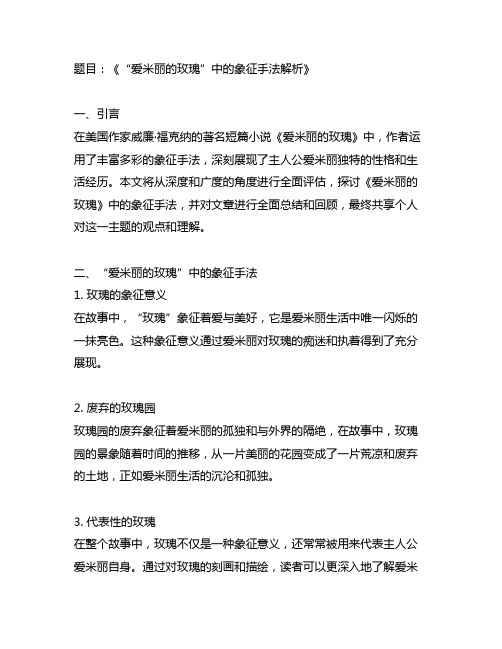
题目:《“爱米丽的玫瑰”中的象征手法解析》一、引言在美国作家威廉·福克纳的著名短篇小说《爱米丽的玫瑰》中,作者运用了丰富多彩的象征手法,深刻展现了主人公爱米丽独特的性格和生活经历。
本文将从深度和广度的角度进行全面评估,探讨《爱米丽的玫瑰》中的象征手法,并对文章进行全面总结和回顾,最终共享个人对这一主题的观点和理解。
二、“爱米丽的玫瑰”中的象征手法1. 玫瑰的象征意义在故事中,“玫瑰”象征着爱与美好,它是爱米丽生活中唯一闪烁的一抹亮色。
这种象征意义通过爱米丽对玫瑰的痴迷和执着得到了充分展现。
2. 废弃的玫瑰园玫瑰园的废弃象征着爱米丽的孤独和与外界的隔绝,在故事中,玫瑰园的景象随着时间的推移,从一片美丽的花园变成了一片荒凉和废弃的土地,正如爱米丽生活的沉沦和孤独。
3. 代表性的玫瑰在整个故事中,玫瑰不仅是一种象征意义,还常常被用来代表主人公爱米丽自身。
通过对玫瑰的刻画和描绘,读者可以更深入地了解爱米丽的内心世界和情感世界。
三、总结与回顾通过深度和广度的探讨,《爱米丽的玫瑰》中的象征手法展现出了丰富的内涵和深刻的意义。
玫瑰作为一种象征,不仅丰富了故事的内涵,还深刻展现了主人公爱米丽的性格和心灵。
对于人性的探索和对生命的思考也在象征手法中得到了充分的表达。
四、个人观点和理解在我看来,《爱米丽的玫瑰》中的象征手法不仅丰富了故事的内涵,更引发了我对生命、爱情和孤独的深刻思考。
通过作者对玫瑰的细腻描绘和对主人公爱米丽内心世界的剖析,我对这一主题有了更加深刻和灵活的理解。
五、结语通过本文的探讨,希望读者能够更全面、深刻地理解《爱米丽的玫瑰》中的象征手法,并从中得到自己的思考和启发。
也希望本文对我指定的主题有着充分的涵盖和探讨。
六、《爱米丽的玫瑰》中的象征手法的现实意义《爱米丽的玫瑰》中的象征手法不仅体现了文学艺术的精妙,更在现实生活中具有重要的意义。
玫瑰象征着爱与美好,废弃的玫瑰园象征着孤独与沉沦,而代表性的玫瑰则是主人公爱米丽的心灵投影。
A Rose for Emily主题分析

她是端庄的南方淑女,她要维护自己的淑 女形象和家族荣誉。面对爱情时, “艾米丽 又蔑视社会等级和道德观念,在恋爱和婚姻中 表 现出强烈的自我和自主意识。”她抛弃了 自己一直信奉的义务和责任甚至家族荣誉,不 顾一切地和 拿日工资的北方佬相爱了,精心 准备婚礼,成为恋爱中的小女人。
Emily
Ethnic conflict and class conflict
“我们已经放弃从他那里了解任何(有关艾米丽) 的消息很长时间了。他不跟任何人说话,甚至可能 不跟(艾米丽)说话,因为他的声音变得既刺耳又 仿佛生了锈,好像从来没用过一样。”
美国南北战争之后,当时的南方还一直 遵从着白人与庄园主至上的思想。阶级长期 的明显分化使得镇上的居民很大程度上忽略 了黑人与白人是平等的,黑人也是人;甚至 是黑人自己也潜意识里认为自己只是主人的 工具,自己不应该有任何关于自己的想法。 特别是在受到严厉旧时家教的艾米丽小姐家 中,这种思想更为深刻。
The conflict between old and new values
Emily
Homer Barron
Contradictions between nobility and labor class
新旧价值观的矛盾、贵族阶级与劳工阶级矛盾 “Homer himself had remarked--he liked men, and it was known that he drank with the younger men in the Elks‟ Club--that he was not a marrying man.”
A Rose for Emily represents Faulkner„s greatest achievements in the writing of short stories. Modernist writing techniques are skillfully used by Faulkner to tell the tragic life of Emily to show the incompatible inner spiritual world of American South in a specific period which is aimed at exploring the eternal theme of conflicts in human heart. Profoundly reflects southern aristocratic(贵 族的 [ə,rɪstə'krætɪk]) decline and decay, and the friction and conflict between the emerging capitalism(资本主义)and the old forces , and the contradiction between old and new values in the period of social change .
a rose for Emily主要人物分析
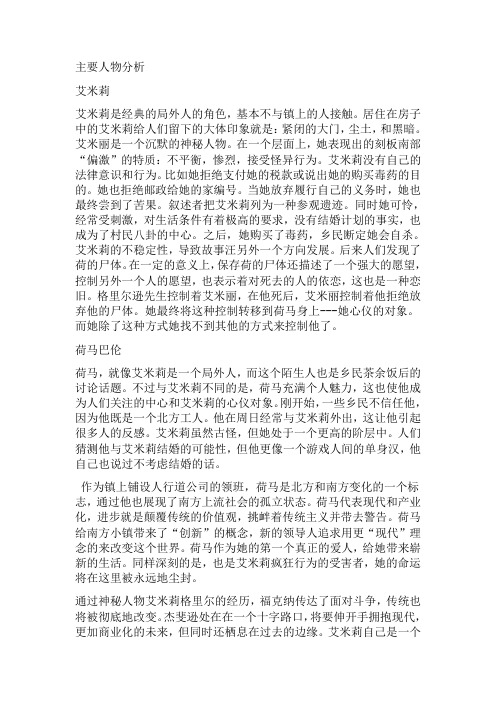
主要人物分析艾米莉艾米莉是经典的局外人的角色,基本不与镇上的人接触。
居住在房子中的艾米莉给人们留下的大体印象就是:紧闭的大门,尘土,和黑暗。
艾米丽是一个沉默的神秘人物。
在一个层面上,她表现出的刻板南部“偏激”的特质:不平衡,惨烈,接受怪异行为。
艾米莉没有自己的法律意识和行为。
比如她拒绝支付她的税款或说出她的购买毒药的目的。
她也拒绝邮政给她的家编号。
当她放弃履行自己的义务时,她也最终尝到了苦果。
叙述者把艾米莉列为一种参观遗迹。
同时她可怜,经常受刺激,对生活条件有着极高的要求,没有结婚计划的事实,也成为了村民八卦的中心。
之后,她购买了毒药,乡民断定她会自杀。
艾米莉的不稳定性,导致故事汪另外一个方向发展。
后来人们发现了荷的尸体。
在一定的意义上,保存荷的尸体还描述了一个强大的愿望,控制另外一个人的愿望,也表示着对死去的人的依恋,这也是一种恋旧。
格里尔逊先生控制着艾米丽,在他死后,艾米丽控制着他拒绝放弃他的尸体。
她最终将这种控制转移到荷马身上---她心仪的对象。
而她除了这种方式她找不到其他的方式来控制他了。
荷马巴伦荷马,就像艾米莉是一个局外人,而这个陌生人也是乡民茶余饭后的讨论话题。
不过与艾米莉不同的是,荷马充满个人魅力,这也使他成为人们关注的中心和艾米莉的心仪对象。
刚开始,一些乡民不信任他,因为他既是一个北方工人。
他在周日经常与艾米莉外出,这让他引起很多人的反感。
艾米莉虽然古怪,但她处于一个更高的阶层中。
人们猜测他与艾米莉结婚的可能性,但他更像一个游戏人间的单身汉,他自己也说过不考虑结婚的话。
作为镇上铺设人行道公司的领班,荷马是北方和南方变化的一个标志,通过他也展现了南方上流社会的孤立状态。
荷马代表现代和产业化,进步就是颠覆传统的价值观,挑衅着传统主义并带去警告。
荷马给南方小镇带来了“创新”的概念,新的领导人追求用更“现代”理念的来改变这个世界。
荷马作为她的第一个真正的爱人,给她带来崭新的生活。
同样深刻的是,也是艾米莉疯狂行为的受害者,她的命运将在这里被永远地尘封。
A Rose For Emily(献给艾米丽的玫瑰花)
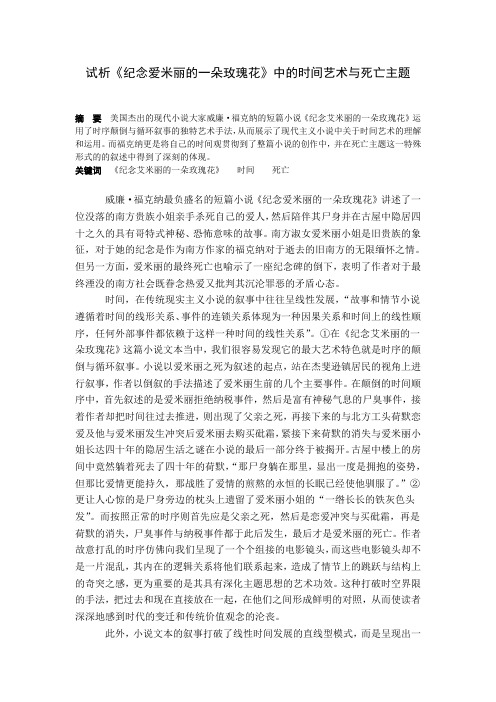
试析《纪念爱米丽的一朵玫瑰花》中的时间艺术与死亡主题摘要美国杰出的现代小说大家威廉·福克纳的短篇小说《纪念艾米丽的一朵玫瑰花》运用了时序颠倒与循环叙事的独特艺术手法,从而展示了现代主义小说中关于时间艺术的理解和运用。
而福克纳更是将自己的时间观贯彻到了整篇小说的创作中,并在死亡主题这一特殊形式的的叙述中得到了深刻的体现。
关键词《纪念艾米丽的一朵玫瑰花》时间死亡威廉·福克纳最负盛名的短篇小说《纪念爱米丽的一朵玫瑰花》讲述了一位没落的南方贵族小姐亲手杀死自己的爱人,然后陪伴其尸身并在古屋中隐居四十之久的具有哥特式神秘、恐怖意味的故事。
南方淑女爱米丽小姐是旧贵族的象征,对于她的纪念是作为南方作家的福克纳对于逝去的旧南方的无限缅怀之情。
但另一方面,爱米丽的最终死亡也喻示了一座纪念碑的倒下,表明了作者对于最终湮没的南方社会既眷念热爱又批判其沉沦罪恶的矛盾心态。
时间,在传统现实主义小说的叙事中往往呈线性发展,“故事和情节小说遵循着时间的线形关系、事件的连锁关系体现为一种因果关系和时间上的线性顺序,任何外部事件都依赖于这样一种时间的线性关系”。
①在《纪念艾米丽的一朵玫瑰花》这篇小说文本当中,我们很容易发现它的最大艺术特色就是时序的颠倒与循环叙事。
小说以爱米丽之死为叙述的起点,站在杰斐逊镇居民的视角上进行叙事,作者以倒叙的手法描述了爱米丽生前的几个主要事件。
在颠倒的时间顺序中,首先叙述的是爱米丽拒绝纳税事件,然后是富有神秘气息的尸臭事件,接着作者却把时间往过去推进,则出现了父亲之死,再接下来的与北方工头荷默恋爱及他与爱米丽发生冲突后爱米丽去购买砒霜,紧接下来荷默的消失与爱米丽小姐长达四十年的隐居生活之谜在小说的最后一部分终于被揭开。
古屋中楼上的房间中竟然躺着死去了四十年的荷默,“那尸身躺在那里,显出一度是拥抱的姿势,但那比爱情更能持久,那战胜了爱情的煎熬的永恒的长眠已经使他驯服了。
”②更让人心惊的是尸身旁边的枕头上遗留了爱米丽小姐的“一绺长长的铁灰色头发”。
A-Rose-for-Emily-英文分析及简评

A-R o s e-f o r-E m i l y-英文分析及简评本页仅作为文档封面,使用时可以删除This document is for reference only-rar21year.March“A Rose for Emily” is divided into five sections.The first section opens with a description of the Grierson house in Jefferson. The narrator mentions that over the past 100 years, Miss Emily Grierson’s home has fall into disrepair and become “an eyesore among eyesores.” The first sentence of the story sets the tone of how the citizens of Jefferson felt about Emily: “When Miss Emily Grierson died, our whole town went to the funeral: the men through a sort of respectful affection for a fallen monument, the women mostly out of curiosity to see the inside of her house, which no one save an old manservant – a combined gardener and cook –had seen in at least ten years.”It is known around town that Emily Grierson has not had guests in her home for the past decade, except her black servant who runs errands for her to and from the market. When a new city council takes over, however, they begin to tax her once again. She refuses to pay the taxes and appear before the sheriff, so the city authorities invite themselves into her house. When confronted on her tax evasion, Emily reminds them that she doesn't have to pay taxes in Jefferson and to speak to Colonel Sartoris, although he had died 10 years before.In section two, the narrator explains that the Griersons had always been a very proud Southern family. Mr. Grierson, Emily’s father, believes no man is suitable for his daughter and doesn't allow her to date. Emily is largely dependent upon her father, and is left foundering when he dies. After Mr. Grierson's death, Emily does not allow the authorities to remove his body for three days, claiming he is still alive. She breaks down and allows authorities to take the body away for a quick burial.Section three introduces Emily’s bea u, Homer Barron, a foreman from the north. Homer comes to Jefferson with a crew of men to build sidewalks outside the Grierson home. After Emily and Homer are seen driving through town several times, Emily visits a druggist. There, she asks to purchase arsenic. The druggist asks what the arsenic is for since it was required of him to ask by law. Emily does not respond and coldly stares him down until he looks away and gives her the arsenic. When Emily opens the package, underneath the skull and bones sign is written, "For Rats."Citizens of Jefferson believe that Miss Emily is going to commit suicide since Homer has not yet proposed in the beginning of section four. The townspeople contact and invite Emily's two cousins to comfort her. Shortly after their arrival, Homer leaves and then returns after the cousins leave Jefferson. After staying in Jefferson for one night, Homer is never seen again. After Homer’s disappearance, Emily begins to age, gain weight, and is rarely seen outside of her home. Soon, Miss Emily passes away.The fifth and final section begins with Jefferson women entering the Grierson home. After they arrive, Emily's black servant leaves through the back door without saying a word. After Emily's funeral, the townspeople immediately go through her house. They come across a room on the second floor which no one had seen in 40 years, and break the door down. They discover a dusty room strangely decorated as a bridal room. The room contains a man's tie, suit and shoes, and a silver toilet set which Miss Emily had purchased for Homer years before his disappearance. Homer's remains lay on the bed, dressed in a nightshirt. Next to him is an impression of a head on a pillow where the townspeople find a single “long strand of iron-gray hair.” It is thus implied that not only had Emily killed Homer with the arsenic, but also has had an intimate relationship with his corpse up to her own death.简评:Miss Emily met Homer Baron, a foreman with a construction company, when her hometown was first getting paved streets. Her father had already died but, not before driving away her eligible suitors. As rumors circulate about her possible marriage to a Yankee, Homer leaves town abruptly. During his absence, Miss Emily buys rat poison.When Homer returns, the t ownspeople see him enter Miss Emily’s house but not leave. Only when she dies do the townspeople discover his corpse on a bed in her house and, next to it, a strand of Miss Emily’s hair.This Gothic plot makes serious points about woman’s place in society. Throughout the story, the reader is aware that these events are taking place during a time of transition: The town is finally getting sidewalks and mailboxes. More important, values are changing. The older magistrates, for example, looked on Miss Emily paternally and refused to collect taxes from her; the newer ones try, unsuccessfully, to do so.Caught in these changing times, Miss Emily is trapped in her role as genteel spinster. Without a husband, her life will have no meaning. She tries to give lessons in painting china but cannot find pupils for this out-of-date hobby and finally discontinues them. If Homer is thinking of abandoning her, as his departure implies, one can understand her desire to clutch at any sort of union, even a marriage in death.The theme is developed through an exceptionally well-crafted story. Told from a third-person plural point of view, it reveals the reactions of the town to Miss Emily. As this “we” narrator shifts allegiance--now criticizing Miss Emily, now sympathizing with her--the reader sees the trap in which she is caught, and the extensive butunobtrusive foreshadowing prepares the reader for the story’s final revelation without detracting from its force.。
(完整word版)A-rose-for-Emily文章赏析
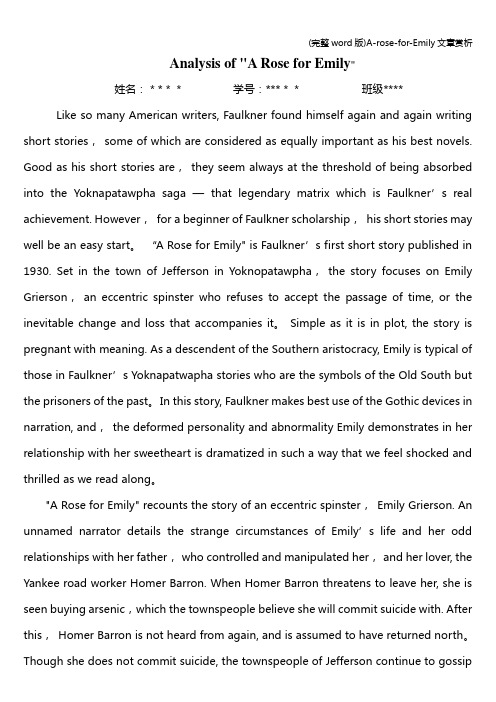
Analysis of "A Rose for Emily"姓名:****学号:*****班级**** Like so many American writers, Faulkner found himself again and again writing short stories,some of which are considered as equally important as his best novels. Good as his short stories are,they seem always at the threshold of being absorbed into the Yoknapatawpha saga —that legendary matrix which is Faulkner’s real achievement. However,for a beginner of Faulkner scholarship,his short stories may well be an easy start。
“A Rose for Emily" is Faulkner’s first short story published in 1930. Set in the town of Jefferson in Yoknopatawpha,the story focuses on Emily Grierson,an eccentric spinster who refuses to accept the passage of time, or the inevitable change and loss that accompanies it。
Simple as it is in plot, the story is pregnant with meaning. As a descendent of the Southern aristocracy, Emily is typical of those in Faulkner’s Yoknapatwapha stories who are the symbols of the Old South but the prisoners of the past。
- 1、下载文档前请自行甄别文档内容的完整性,平台不提供额外的编辑、内容补充、找答案等附加服务。
- 2、"仅部分预览"的文档,不可在线预览部分如存在完整性等问题,可反馈申请退款(可完整预览的文档不适用该条件!)。
- 3、如文档侵犯您的权益,请联系客服反馈,我们会尽快为您处理(人工客服工作时间:9:00-18:30)。
Ⅰ.Introduction“A Rose for Emily”is a classic story representing Faulkner’s favorite subject, theme and style. The story is set in the town of Jefferson in his imaginary Yoknapatawpha County, the “mythical kingdom”. The story begins with a funeral of the eponymous Miss Emily. It does not follow a particular order of chronological time. The narration flows backwards or forwards in a line of reality, revealing significant details of Emily’s life and the murder of the Homer Barron by Emily, which are suspended till the end of the story. The narrative is also divided into five parts, allowing for flexible shifts in time and displays of Emily’s image at various stages of her life. Through the story about Emily, the author tries to pinpoint an unavoidable fate of the aristocracy and various changes in the South America after the Civil War.In this story, Emily Grierson, the main character, is a victim. Dominated by her father and his rigid ideas of social status, she has been prevented from marrying during her li fetime. One year after her father’s death, she falls in love with a northerner. When she finds that her lover is not going to get married with her, she poisons him so that she can keep him with her forever. Though the plot of the story is not complicated, yet it can be considered as a minor program of his works. In it are examples of Faulkner’s artistic preoccupations and techniques: the exploration of psychological reality, the social structure and mores of a southern community, the nature of time, and the relation of the past to the present. This paper will approach the story from the following aspects: analysis of Emily’s character, the root causes of her characters and her destiny.Ⅱ.Analysis of Emily’s charactersEmily is the main character, the protagonist of the story. In this story, the author mainly focuses and reveals the main characte r—Emily. In order to analyze Emily’s character, some question s have at first to be answered: What type is this story or what kind of theme this story plans to reveal? When answering these questions, it becomes much easier to analyze her character. Miss Emily is kind of quiet andperverse, proud and aloof, haughty, brave and tough, a representative of traditional convention and so forth. The followings are going to expatiate on them.2.1Miss Emily’s haughty characterAt the very first, Emily is easy to be regarded as a haughty woman. In the story, the writer not only reveals the abnormal phen omenon of Emily’s grotesque character and her ill-sexed psychology, but also lively portrays her as a strong figure of haughtiness. Miss Emily Grierson is the socialite of her town. Naturally with this status there is a certain reputation she has to withhold. She not only represented her family name but, in a sense the people of her town. Because she was such a dominant figure the townspeople had put her on a pedestal and were very attentive to her actions. During the time in which her father was alive Emily was seen as a figure to be admired but never touched. Many wooers she had but according to her father’s standard, none were suitable enough.2.2 Miss Emily’s isolated and eccentric characterBesides, Miss Emily is isolated and eccentric. From the whole story, there is no doubt that she was an isolated one from the beginning of the story to the surprising end. All her life is the town people’s topic after meals.They regard her as a monster. And because of her family, in particular, her father, she nearly get separated from her neighbors, which adds more pressure to her personal affairs to fall in love with the Yankee, Homer Barron, which, at last, creates the tragedy. On the other hand, she is eccentric at the same time. When the men from the government want to tax her afterher father’s death, but they are refused by Emily. The reason is quite simple, that is, when her father is alive, in Jefferson, they need not to pay taxes. She just tells the government that she has no taxes in Jefferson. What she said was the matter several years ago. And there was once a man called Colonel Sartoris explained it to her about her tax-free privilege. She does not respect the truth, that is, her so-called Colonel died ten years ago and new policy comes into practice. The narrator arranges the specific detail on her behavior of buying Arsenic. The druggist can not imagine her purpose in buying the poison and just thinks that she might use it for rat and such things. Miss Emily just stares at him, her head tilts back in order to look him eye for eye, until he looks away and goes and gets the arsenic and wraps it up for her. How strange and eccentric she is. She does not allow anyone to ask about her matter, even though it is a dangerous affair which is forbidden by law.2.3 Miss Emily’s necrophiliaMiss Emily is a necrophilia, too. Greatly surprised at the sight of the last paragraph of Faulkner’s short-story “A Rose for Emily”, the town people find that Miss Emily is not only a murderer, but also sleeps with Homer Barron after she kills him. Then it is noticed that in the second pillow is the indentation of a head. One of the townspeople lifts something from it, and leans forward, finding the faint and invisible dust dry and acrid in the nostrils, and a long strand of iron-gray hair. Horribly, she kills her lover and sleeps next to him for a long time until being found out. As forthe whole passage, the narrator refuses to dismiss Emily as simply mad or to treat her life as merely a grotesque, sensational horror story.Instead, his narrative method brought us into her life before we hastily rejectedher, and doing so offered us a complex imaginative treatment of fiercedetermination and strength coupled with illusions and shocking eccentricities.4 2.4 Miss Emily’s braveness and toughnessShe is brave and tough as well. As a woman, Emily is normal. She just tries her best to pursue her happiness. In this story, the most attractive part for a great number of people is Emily’s brave pursuit of love. Only after her father’s death, she begins to have the right to love. “In the summer after her father’s death, she has her hair cut short and looks like a little girl. Soon she falls in love with Homer, who is a Yankee, a northerner and a day labor as well.” She holds her head high in her dignity as she is the last Grierson of her family though the townspeople think she has fallen because she is with a man who is different from her. However, Emily’s love affair is not affected by the townspeople and her two female cousins’ interference. What’s more,Ⅲ.Intrinsic and extrinsic Reasons3.1 Intrinsic reasons3.1.1 FamilyIt is her family, especially her father that influences her so much. Emily, the heroine in the story, is a victim. Dominated by her father and his rigid ideas of social status, she has been prevented from marrying during his life time and therefore after his death, she is left alone and penniless. Her dependence on her father continues evenafter he dies; she refuses to bury him and keep his portrait in a prominent place in her living room. Emily not only clings to her father’s memory, she also begins to assume his domineering traits. She does not accept the passage of time and changes or the inevitable loss that accompanies it. It is not just pathetic attempts to cling to the past, it develops into obsession and finally, homicidal mania. Rather than lose Homer as she lost her father, she kills him in order to keep him. She lives many years as a recluse. Abnormal characters are easy to form when under such strong pressure. It is Emily’s family that ruins her life and then Homer’s.3.1.2 PhysiologyEmily’s typical characters are cause by another important reason, namely, the physiological one. From Freud Sigmund’s narration, there are three conceptions which are connected to the analysis needed to understand, that is, Id, Ego, and Super-ego.They are the three parts of the fictive “psychic apparatus” defined in Freud’s so-called structural model of the psyche; they are the three theoretical constructs in terms of whose activity and interaction mental life is described. According to this model, the uncoordinated instinctual trends are the “id”; the organized realistic part of the psyche is the “ego”, and the critical and mora lizing function the “super-ego”.The Id comprises the unorganized part of the personality structure that contains the basic drives. The Id is unconscious by definition.6Id is human’s first reaction when human physiological needs happen, which is also an unorganized phenomenon. Miss Emily just tries her best to chase her happiness as other normal women do. From this angle, Miss Emily has the right to fall in love with Homer and to have their own family. What she has done is within the common practice. However, a lot of elements result in the tragic sequel. It is she that can not grasp the physiological element and causes her unhappy or even miserable destiny.3.1.3 Pathology and psychologyThere is another important intrinsic reason, that is pathological and psychological one. From her behavior to her father Mr. Drieson, she is completeElctra Comlex(恋父情结). She lived with her father when Mr. Grieson was alive, without communicating with others. Mr. Grieson controlled her whole life completely, which is the root that causes Miss Emily’s tragedy and Homer’s. What is more, Emily’s father drove away all the young men who were going to chase his daughter for the reason that he just wanted to hold Emily for himself. In Emily’s sub-consciousness, her father is her lover. It is this kind of abnormal psychology that influences the formation of Emily’s abnormal characters. In Emily’s eyesight, losing her father amounts to losing her lover. And that means she will be alone from that time on. Therefore, she refuses to bury her father even though he has been dead for several days. And at last she kills her own lover just in order to keep him with her.3.2 Extrinsic reasonsWhen referred to intrinsic reasons, it is easy to think of extrinsic reasons causing Miss Emily’s characters and her destiny. What is more, the extrinsic reasons play a crucial role on her which worth of researching here.3.2.1 Cultural traditionCultural tradition makes great impact on Emily’s characters and the tragedy. Faulkner was aware of t he Southerners’ association with the South tradition,not only physical,but spiritual as well; so he took pains to picture a group of Southerners who desperately submitted to the old way of life.But as an artist of the twentieth century, he observed the gradual changes of the South: the old veterans were dying of, and the old loyalties were adjusted to conform to new conditions.In “A Rose for Emily”,Faulkner described the conflicts between the old tradition and the new order, and the doomed defeat of the old tradition.Emily lived in her big and squarish frame house, which Grierson family thought the great choice. But her house was on its way to “coquettish decay above the cotton wagons and the gasoline pumps. And the once most select street which was filled with houses decorated with cupolas and spires andscrolled balconies in the heavily l ightsome style of the seveties” was then encroached and obliterated by garages and cotton gins. Faulkner admired somewhat the merits of the South tradition—the compassion and humanity men like Colonel Sartoris and his peer s–inherited forced them to tell a kind lie to Emily so as to look after the single lady without insulting her dignity.But only a man of Colonel Sartoris’ generation and thought could have invented it. The moral values of the South tradition were lost.The new generation of public officials may be more efficient and businessman-like. They were more practical; the next generation,with its more modern ideas,produced some little dissatisfaction with the hereditary obligation upon the town. but the old generation like Judge Stevens totally objected to the idea for it was shameful to let others know that such noble lady had smell on her faces. The conflicts between the old generation and the new one indicated the decline of the Southern tradition.Faulkner believed that it was the moral values—courage,honor,pride,compassion,liberty and justice that produced the glorious Southern kingdom,but the new generation lost the virtues,thus losing its faith and force.The loss of the South tradition and the appearance of the North industrialization caused not only the devastation of the Southern plantation system, but also the macabre disillusionment to the Southern descendants. They were reared in the ways of the traditional South, vividly taught the beliefs and the loyalties of the tradition as the South knew them.Whereas,they saw that world changing into another kind and they were themselves of that new changed world,yet apart from it.Faulkner revealed with intensity the rootless of the Southern descendants.They witnessed that the Northern industrialization penetrated the South, but their inherited Southern aristocracy forbade their acceptance of the new order of life.They stubbornly objected to the invasion of the northern way of life, but in vain.So the Southern descendants had to suffer from the loneliness and bitterness of separating from the new world.The disillusionment of the Southerners was wel1 revealed in the portrayal of Emily, which is a symbol that Emily’s characters form ed and caused her tragic end. For Miss Emily, she holds a firm conception that the Southern tradition or her family system is some sort of superiority. Therefore, when another new system-the Northern one comes into being, she just can not accept the truth and does some deeds to resist it andprotect her “perfect one”. It is such behaviors and traditions that makes her abnormal characters.3.2.2 Social elementAnother extremely crucial factor for Emily’s characters to form is the social element. Here it mainly refers to the environment—the Jefferson community around her. For the townspeople, Grieson family never choose a northerner, a day labor. They think even though Emily is sad, she can not forget that she is a noble. They seem to be Emily’s new father after her father died. They try to control Emily on her love affair. When Emily and Homer appear together, they talk about them with scornful expression. However, the community’s opposition does not influence Emily’s persistent love with Homer. If the townspeople give up at this moment, the result of Emily may be much better. But, instead the opposition becomes further intensified. A priest gets in and fails. Then come Emily’s two far-distance cousins. From the writer’s viewpoint in the story, Miss Emily has been much better when she fall love in Homer. But the social environment pushes her to the edge of an abnormal woman again and again.Ⅳ.DestinyShe refused to release her father’s body for burial,and kept his portrait in a prominent place in her living room:She refused to cooperate with modernization in the tax-paying service, answering the tax notice “on paper of an archaic shape, in a thin, flowing calligraphy in faded ink…”Her clinging to the past developed into such obsession and homicidal mania that she killed Homer Barron when she knew he would not marry her. So she killed him and kept the body,From Emily’s tragic end and Faulkn er’s other characters,we can see the portentous disillusionment of the Southern descendants in the transitional period.“They isolated themselves from the actual society, so what they could do was only to miss the past desperately until at last they died with deep agony.”9Consequently, Miss Emily suffered great pressure from the society, her family tradition, her relatives and community’s nonchalance etc. on her personal affair which finally caused her to die. Nonetheless, nobody paid much attention to whether she was alive or dead. Poor Emily is a character of misery. She is the sacrificial lamb of her time.Ⅴ.ConclusionEmily was respected as a monument by townspeople. Emily’s resistance is heroic. Her tragic flaw is the conventional pride: she undertook to regulate the natural time- universe. She acted as though death did not exist, as though she could retain her unfaithful love by poisoning her lover and holding his physical body in a world which had all of the appearances of reality except that most necessary of all things- life. Because Homer died, he couldn’t marry Miss Emily, then the monument continued to exist in the south people. In fact, the two generations ignored the real Emily, and create and maintain the myth of Emily as an example of southern womanhood from a last age. The writer uses the comic technique to disclose the conflict between south and north. This conflict cannot easily be solved at that time. Instead, it does great harm to Emily doomed destiny.In the above passage, Miss Emily’s characters are analyzed from different dimensions. At first, her behavior shows that she is a haughty, isolated and eccentric, necrophilia but brave and tough woman. Her characters are complex and to some extent ambivalent. From the intrinsic and extrinsic reasons above, it is known that Emily tragic destiny is doomed to happen at last.An analysis of "A Rose for Emily"William Faulkner regarded the past as a repository of great images of human effort and integrity, but also as the source of a dynamic evil. He was aware of the romantic pull of the past and realized that submission to this romance of the past was a form of death (Warren, 269). In "A Rose for Emily", Faulkner contrasted the past with the present era. The past was represented in Emily herself, in Colonel Sartoris, in the old Negro servant, and in the Board of Alderman who accepted the Colonel's attitude toward Emily and rescinded her taxes.The present was expressed chiefly through the words of the unnamed narrator. The new Board of Aldermen, Homer Barron (the representative of Yankee attitudes toward the Griersons and thus toward the entire South), and in what is called "the next generation with its more modern ideas" all represented the present time period. Miss Emily was referred to as a "fallen monument" in the story. She was a "monument" of Southern gentility, an ideal of past values but fallen because she had shown herself susceptible to death (and decay). The description of her house "lifting its stubborn and coquettish decay above the cotton wagons and the gasoline pumps--an eyesore among eyesores" represented a juxtaposition of the past and present and was an emblematic presentation of Emily herself (Norton Anthology, 2044).The house smells of dust and disuse and has a closed, dank smell. A description of Emily in the following paragraph discloses her similarity to the house. "She looked bloated like a body long submerged in motionless water, and of that palled hue". But she had not always had that appearance. In the picture of a young Emily with her father, she was frail and apparently hungering to participate in the life of the era. After her father's death, she looked like a girl "with a vague resemblance to those angels in colored church windows--sort of tragic and serene". This suggests that she had already begun her entrance into the nether-world.By the time the representatives of the new, progressive Board of Aldermen waited on her concerning her delinquent taxes, she had already completely retreated to her world of the past. She declared that she had no taxes in Jefferson, basing her belief on a verbal agreement made with Colonel Sartoris, who had been dead for ten years. Just as Emily refused to acknowledge the death of her father, she now refused to recognize the death of Colonel Sartoris. He had given his word and according to the traditional view, his word knew no death. It is the past pitted against the present--the past with its social decorum, the present with everything set down in "the books."We can further see this distinction in the attitude of Judge Stevens, who was over eighty years old, and the young man (a member of the rising generation) who came to the judge regarding the smell at Emily's house. For the young man, it was easy to point out the health regulations that were on the books. But for the judge dealing with the situation it was not so simple. "Dammit, sir...will you accuse a lady to her face of smelling bad?" (Norton Anthology, 2045). If Homer had triumphed in seducing Emily and deserting her, Emily would have become susceptible to the town's pity, therefore becoming human.Emily's world, however, was already in the past. When she was threatened with desertion and disgrace, she not only took refuge in that world but also took Homer with her in the only manner possible--death. Miss Emily's position in regard to the specific problem of time was suggested in the scene where the old soldiers appear at her funeral. There are two perspectives of time held by the characters. The first perspective (the world of the present) views time as a "mechanical progression" in which the past is a "diminishing road" (Norton Anthology, 2049). The second perspective (the world of tradition and the past) views the past as "a huge meadow which no winter ever quite touches, divided from them now by the narrow bottleneck of the most recent decade of years" (Norton Anthology, 2049). The first perspective was that of Homer and the modern generation. The second was that of the older members of the Board of Aldermen and of the confederate soldiers. Emily held the second view as well, except that for her there was no bottleneck dividing her from the meadow of the past.Emily's room above the stairs was that timeless meadow. In it, the living Emily and the dead Homer remained together as though not even death could separate them. In the simplest sense, the story says that death conquers all. But what is death? On one level, death is the past, tradition, whatever is opposite of the present (Hoffman, 265). In the setting of this story, it is the past of the South in which the retrospective survivors of the Civil War deny changing the customs and the passage of time.Homer Barron, the Yankee, lived in the present, ready to take his pleasure and depart, apparently unwilling to consider the possibility of defeat neither by tradition (the Griersons) nor by time itself (death). In a sense, Emily conquered time, but only briefly and by retreating into her "rose-tinted" world of the past. This was a world in which death was denied at the same time that it was shown to have existed. Such retreat, the story implies, is hopeless since everyone, even Emily, was finally subject to death and to the invasion of his or her world by the clamorous and curious inhabitants ofthe world of the present. "When Miss Emily died, [the] whole town went to her funeral...the women mostly out of curiosity to see the inside of her house, which no one save an old manservant...had seen in at least ten years" (Norton Anthology, 2044).艾米丽小姐大多数时候隐藏在情节里。
